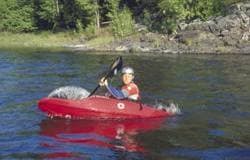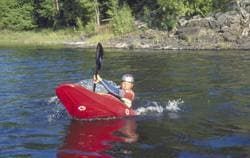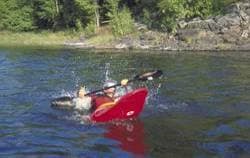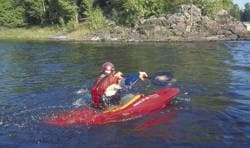The Pivot Turn
The pivot turn is the most powerful and effective means of turning your whitewater kayak and is one of the most important individual skills to learn. It will let you run rapids more confidently, and it opens the door to virtually every playboating move. The pivot turn requires a combination of fine edge control, balance, power, and it relies on your understanding of buoyancy energy, which we will look at in more detail.
The pivot turn is basically an ultra-effective sweep stroke during which one end of your kayak is pulled underwater, bringing the other end into the air. We're going to start by making sure that everyone is using the same sweep stroke technique. The sweep stroke is the main turning stroke for kayaks, and has been taught in a variety of different ways over the years, but as whitewater kayaks have gotten smaller, there is only one technique that you'll ever need to use.


Starting from the top, you should turn your kayak in the same way you would turn your car. This means looking in the direction you wish to go, rather than staring at your hood ornament! With the sweep stroke, you do this by turning to face the direction in which you intend to turn. Your head and body should be turned enough to actually see your stern out of the corner of your eye. When your head and body is leading the way like this, we say that the body is 'wound up'. Think of your body as an elastic band, the more you wind it up, the more power you'll have access to!
With your body wound up, plant your sweep firmly and completely in the water at your toes. When pulling on the sweep stroke, your top hand should stay between chest and chin height and your paddle should sweep as far out to the side of the kayak as possible. Meanwhile, your knees and stomach muscles can pull your legs around, effectively unwinding your body.


The stern pivot turn involves slicing the stern of your kayak underwater while taking your forward sweep. By sinking your stern, your bow will lift off the water and you'll pivot very quickly. To sink your stern, tilt your boat slightly into your sweep stroke and throw your weight backward as you pull down and sweep out to the side with your sweep stroke.
Now that your stern is slicing underwater and your boat is turning, your ability to deal with buoyancy energy will either kill your pivot turn, or give your turn an incredible boost. Buoyancy energy is the desire your boat has to resurface anytime it is underwater. When you're pulling on your paddle, you can override your boat's buoyancy energy, but as soon as your stroke has finished, your stern will take the quickest route back to the surface. By establishing a boat tilt that offers your stern a route to the surface in the direction that you're spinning, its buoyancy energy will do the rest of the work for you.

So this is what you need to do; after pulling your stern underwater, you must level off your boat tilt BEFORE your sweep stroke has finished. If you don't level off your tilt quickly enough, you'll 'hit the wall'. Hitting the wall means your stern will pop back to the surface in the direction that it came from, and your spin will end abruptly. If you do level off your tilt in time, then your sterns buoyancy energy will spin your kayak around. To level off your boat tilt, think about pulling upward with the knee that is on the sweeping side of your kayak, and push your weight over top the kayak with your sweep stroke.
The pivot turn is a great skill to practice in the pool because anyone can do it. If you're just starting out, then only try to lift your bow a couple of inches out of the water. As you get better, start pulling your bow more and more aggressively into the air. Keep in mind that the goal of this drill is not to pull your bow as high out of the water as possible. The goal is to use the power of buoyancy energy after your bow is in the air. This means making a smooth edge transition and levelling off your boat tilt before your sweep has finished. Ultimately, you should be able to do a full 360 spin with your one stroke.
Ken Whiting was the 1997/98 World Whitewater Freestyle Champion. He has produced an award-winning series of instructional kayaking books and DVDs, and leads kayaking trips to Chile. Look for his latest book 'The Ultimate Guide to Whitewater Kayaking', and video 'The Ultimate Guide to Sea Kayaking'. Check out www.helipress.com
Related Articles
Even though they are flipping over, missing their gates and failing their maneuvers, they still look…
In this video, we're going to look at five kayaking tips that will help make you a better paddler, or…
As a member of the US Surf Kayaking Team I had the honor and privilege to compete in the world…
Eddy turns are the foundation for paddling in current, enabling you to enter and exit river and tidal…


